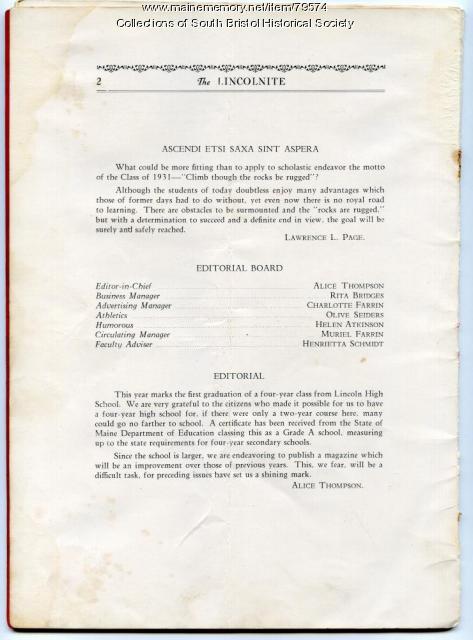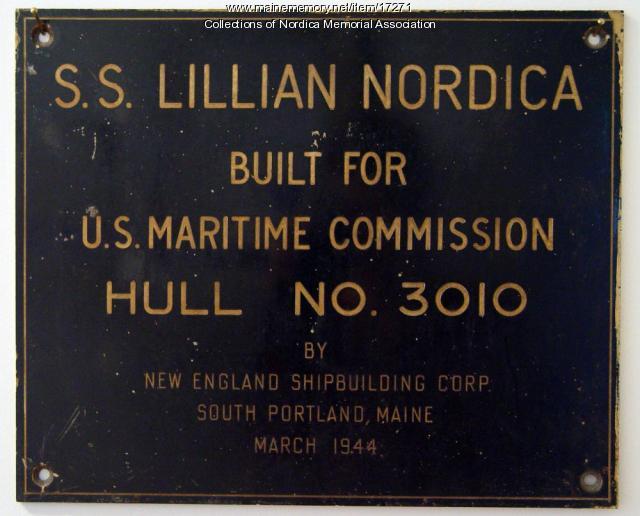Keywords: south
Item 79574
Lincolnite yearbook editorial page, South Bristol, 1931
Contributed by: South Bristol Historical Society Date: 1931 Location: South Bristol Media: Ink on paper
Item 40414
South Portland girls basketball, 1924
Contributed by: Maine Historical Society/MaineToday Media Date: 1924 Location: South Portland Media: Glass Negative
Item 76244
16 South Street, Portland, 1924
Owner in 1924: Mark A. Sulkowitch Use: Apartments
Item 89767
42 South Street, Portland, 1924
Owner in 1924: Grace Anderson Use: Dwelling
Item 151763
Proposed addition to the High School, South Portland, 1935-1937
Contributed by: Maine Historical Society
Date: 1935–1937
Location: South Portland
Client: CIty of South Portland
Architect: Miller & Beal Inc. Architects
This record contains 4 images.
Item 151726
Pine Street School, South Portland, 1927
Contributed by: Maine Historical Society
Date: 1927
Location: South Portland
Client: City of South Portland
Architect: John Calvin Stevens and John Howard Stevens Architects
This record contains 2 images.
Exhibit
South Portland's Wartime Shipbuilding
Two shipyards in South Portland, built quickly in 1941 to construct cargo ships for the British and Americans, produced nearly 270 ships in two and a half years. Many of those vessels bore the names of notable Mainers.
Exhibit
A Town Is Born: South Bristol, 1915
After being part of the town of Bristol for nearly 150 years, residents of South Bristol determined that their interests would be better served by becoming a separate town and they broke away from the large community of Bristol.
Site Page
South Portland Historical Society
View collections, facts, and contact information for this Contributing Partner.
Site Page
South Bristol Historical Society
View collections, facts, and contact information for this Contributing Partner.
Story
My Years of Coaching and Lessons Learned
by Bob Brown
How growing up and coaching in Maine, and around the world, made me who I am today.
Story
Redlining and the Jewish Communities in Maine
by David Freidenreich
Federal and state policies created unfair housing practices against immigrants, like redlining.
Lesson Plan
Grade Level: 3-5, 6-8, 9-12
Content Area: Social Studies, Visual & Performing Arts
"In the four quarters of the globe, who reads an American book?" Englishman Sydney Smith's 1820 sneer irked Americans, especially writers such as Irving, Cooper, Hawthorne, and Maine's John Neal, until Henry Wadsworth Longfellow's resounding popularity successfully rebuffed the question. The Bowdoin educated Portland native became the America's first superstar poet, paradoxically loved especially in Britain, even memorialized at Westminster Abbey. He achieved international celebrity with about forty books or translations to his credit between 1830 and 1884, and, like superstars today, his public craved pictures of him. His publishers consequently commissioned Longfellow's portrait more often than his family, and he sat for dozens of original paintings, drawings, and photos during his lifetime, as well as sculptures. Engravers and lithographers printed replicas of the originals as book frontispiece, as illustrations for magazine or newspaper articles, and as post cards or "cabinet" cards handed out to admirers, often autographed. After the poet's death, illustrators continued commercial production of his image for new editions of his writings and coloring books or games such as "Authors," and sculptors commemorated him with busts in Longfellow Schools or full-length figures in town squares. On the simple basis of quantity, the number of reproductions of the Maine native's image arguably marks him as the country's best-known nineteenth century writer. TEACHERS can use this presentation to discuss these themes in art, history, English, or humanities classes, or to lead into the following LESSON PLANS. The plans aim for any 9-12 high school studio art class, but they can also be used in any humanities course, such as literature or history. They can be adapted readily for grades 3-8 as well by modifying instructional language, evaluation rubrics, and targeted Maine Learning Results and by selecting materials for appropriate age level.
Lesson Plan
Maine in the News: World War I Newspaper Project
Grade Level: 9-12
Content Area: Social Studies
This lesson plan is designed to introduce students to the important role that Maine played in World War I. Students will act as investigators in order to learn about the time period as well as the active role that Maine took on.





















